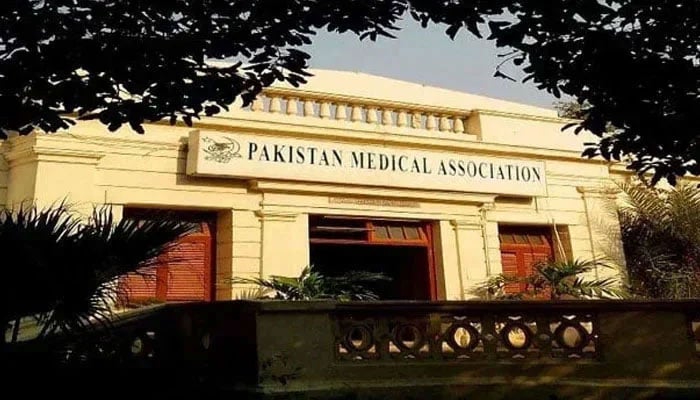‘Pakistan 100 years behind in implementation despite years of digital transformation rhetoric’
The Concerned Citizens Alliance (CCA) organised a seminar at the Pakistan Medical Association (PMA) House, Karachi, on Wednesday, focusing on the transformative role digitalisation can play in governance and taxation.
The event featured two detailed presentations followed by a question-and-answer session with representatives from the business community, labour unions, professional associations, and civil society.
The first presentation, titled “How Digitalisation Can Revolutionise Governance and Service Delivery,” was delivered by prominent social activist Naeem Sadiq. He stressed that despite years of rhetoric around "digital transformation", Pakistan remains a hundred years behind in actual implementation. He criticised the government's outdated and inefficient administrative practices, citing the example of over 6,000 physical copies of an Eid holiday notification being circulated in June 2025, something that could have been managed through a single email.
Sadiq pointed out that Pakistan lacks basic data systems, with no consolidated records of graveyards, wedding halls, shops, restaurants, commercial establishments, or even reliable data on births, deaths, and labour registrations. He emphasised that the absence of integrated digital systems prevents effective governance and accountability.
He proposed the development of integrated, federated digital databases that link individuals, organisations, activities, events, materials, and services. Once provided to one government agency, the information should be available across all departments. Such digital integration, he argued, would eliminate the culture of photocopies, affidavits, and repeated visits to government offices, replacing it with efficient, citizen-centred service delivery from home.
The second presentation, “How Digitalisation Can Reduce the Size of the Informal Economy and Enlarge the Tax Net,” was given by Anwar Kashif Mumtaz, president of the Pakistan Tax Lawyers Association. He highlighted that taxation is a fundamental pillar of governance and economic development, and Pakistan's current tax system suffers from poor compliance, weak documentation, and bureaucratic inefficiencies. He outlined a comprehensive road map for digitally transforming Pakistan’s tax ecosystem.
Key strategies included strengthening tax infrastructure through portals like IRIS and cloud-based platforms, using big data and artificial intelligence to detect tax evasion, and promoting e-filing and digital payments through mobile apps and payment gateways. He also advocated the use of blockchain for transparent transaction records and smart contracts for automated tax processes.
Other recommendations included offering digital tax rebates, developing a taxpayer rating system, partnering with fintech firms, integrating tax systems with accounting software, updating legal frameworks for digital audits, and ensuring robust cybersecurity and data privacy protections. He stressed the importance of clear monitoring indicators and third-party audits to track progress.
Mumtaz concluded that digitalising taxation in Pakistan is not merely a technological shift, but a structural reform that requires political will, legal reforms, innovation, and collaboration with the private sector. With the right approach, Pakistan could expand its tax base, increase revenue, and reduce reliance on external borrowing.
During the interactive session that followed, participants agreed that Pakistan already possesses the required technology to link government departments and expand digital governance, but suffers from a lack of political will. There was a general consensus that, if appropriately implemented, these reforms could double the current 11 percent tax-to-GDP ratio and significantly improve public services within three to four years.
The meeting concluded with a joint resolve to collaborate with other civil society organisations to advocate for the adoption of these urgently needed reforms. Mirza Ali Azhar, coordinator of the CCA, welcomed the guests, while Azhar Jamil, co-founder and convener of the Economics Committee of the CCA, moderated the discussion.
-
 Pentagon Threatens To Cut Ties With Anthropic Over AI Safeguards Dispute
Pentagon Threatens To Cut Ties With Anthropic Over AI Safeguards Dispute -
 Meghan Markle's Father Shares Fresh Health Update
Meghan Markle's Father Shares Fresh Health Update -
 Travis Kelce Takes Hilarious Jab At Taylor Swift In Valentine’s Day Post
Travis Kelce Takes Hilarious Jab At Taylor Swift In Valentine’s Day Post -
 NASA Confirms Arrival Of SpaceX Crew-12 Astronauts At The International Space Station
NASA Confirms Arrival Of SpaceX Crew-12 Astronauts At The International Space Station -
 Can AI Bully Humans? Bot Publicly Criticises Engineer After Code Rejection
Can AI Bully Humans? Bot Publicly Criticises Engineer After Code Rejection -
 Search For Savannah Guthrie’s Abducted Mom Enters Unthinkable Phase
Search For Savannah Guthrie’s Abducted Mom Enters Unthinkable Phase -
 Imagine Dragons Star, Dan Reynolds Recalls 'frustrating' Diagnosis
Imagine Dragons Star, Dan Reynolds Recalls 'frustrating' Diagnosis -
 Steve Jobs Once Called Google Over Single Shade Of Yellow: Here’s Why
Steve Jobs Once Called Google Over Single Shade Of Yellow: Here’s Why -
 Barack Obama Addresses UFO Mystery: Aliens Are ‘real’ But Debunks Area 51 Conspiracy Theories
Barack Obama Addresses UFO Mystery: Aliens Are ‘real’ But Debunks Area 51 Conspiracy Theories -
 Selma Blair Explains Why Multiple Sclerosis 'isn't So Scary'
Selma Blair Explains Why Multiple Sclerosis 'isn't So Scary' -
 Will Smith Surprises Wife Jada Pinkett With Unusual Gift On Valentine's Day
Will Smith Surprises Wife Jada Pinkett With Unusual Gift On Valentine's Day -
 Shamed Andrew Has Paid Royal Favours With ‘national Scandal’
Shamed Andrew Has Paid Royal Favours With ‘national Scandal’ -
 Prince William Ticked Off By How Andrew ‘behaved With Staff’
Prince William Ticked Off By How Andrew ‘behaved With Staff’ -
 Prince William Questions Himself ‘what’s The Point’ After Saudi Trip
Prince William Questions Himself ‘what’s The Point’ After Saudi Trip -
 James Van Der Beek's Friends Helped Fund Ranch Purchase Before His Death At 48
James Van Der Beek's Friends Helped Fund Ranch Purchase Before His Death At 48 -
 King Charles ‘very Much’ Wants Andrew To Testify At US Congress
King Charles ‘very Much’ Wants Andrew To Testify At US Congress




